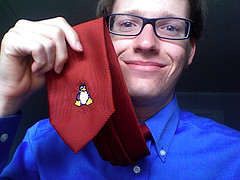20 Years of Linux down, and the best is yet to come


The leaders of Linux aren’t ready to declare victory over Microsoft, Zemlin told me before the presentation, but “We’re beyond the obsession with Microsoft.”
In his presentation, Zemlin amply demonstrated why Linux vendors, developers and users are looking far beyond Microsoft. Zemlin who had had a nasty ski accident, opened his presentation with a clever video celebrating 20-years of Linux history.
From there, Zemlin pointed out that Linux runs everything from air traffic control systems to infotainment systems to nuclear submarines. Linux also powers the $10-billion CERN super collider, the special effects in Avatar. Zemlin also pointed out that Linux-powered stock markets now trade “72% of the world’s equity trades in 2010.” This, I might add, was before the London Stock Exchange went to Linux earlier this year. And of course, there’s been a "complete inversion" in supercomputing. In ten years, the top 500 supercomputers have switched from 96% Unix to 96% Linux.
This is all stuff that tech fans might care about but what about the real world? The real world does care... a lot.
Zemlin pointed out that “Wall St. is telling the world that Linux is the future. Over the last 10-years of comparing “Red Hat Stock price vs. Microsoft, you can see that Red Hat’s stock price has gone up 400% while MS stock price has remained stagnant. Sure Microsoft’s market cap is greater and revenue is greater, but for long term future growth, Wall St. believes in Linux and Red Hat.”
Looking ahead Zemlin, after talking not just to people in Linux but in the technology business at large, sees much more innovation around business models being built on top of open source coming down the road. For example, Amazon’s Kindle, which is an Android Linux device, has enabled Amazon to sell more books. Zemlin believes we’ll see more interesting uses of Linux in support of both old and new business models.
As for mobile, Zemlin thinks “The fat lady hasn’t sung in mobile yet. There are huge sea changes ahead. There will be new mobile devices and business models.” He won’t even guess what these might be because mobile is such a hot and changeable field. All he does know is that since open source enables companies to control their own destiny, Linux and open source will have major roles to play in smartphones and tablets.
Zemlin concluded this part of his presentation by encouraging the audience to not believe in the current wave of “FUD about copyright and patent violations.” The real problem is with the patent system. None of these problems in general are specific to open source and the specific complaints always seem to be coming from Linux’s competitors so you have to take them with a large grain of salt.
As for Linux real’s future, after introducing the 1.0 release of the new Yocto Project for embedded Linux developers, Zemlin said, “The next Steve Jobs is probably using Linux. That’s a safe bet because Linux and open-source tools make it so easy to create. Linux give developers the richest colors, the best possible tools, to allow them to create that product, whatever it is. The next breakthrough device will be running Linux"
Related Stories Linux Foundation chief says battle with Microsoft over ... and that Linux is victorious!
Beyond Ubuntu CDs, Ubuntu Devices?
The new Ubuntu Desktop: Unity Red Hat turns on Oracle and other Red Hat Linux clone-makers